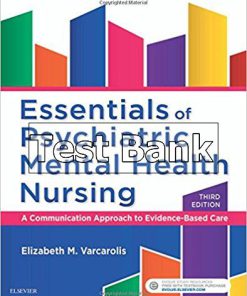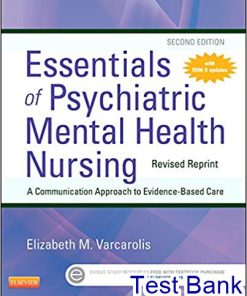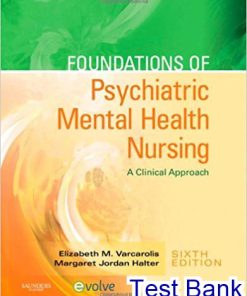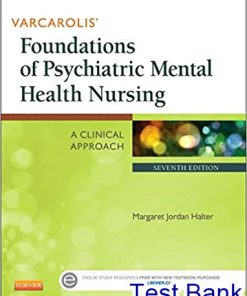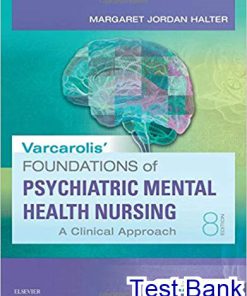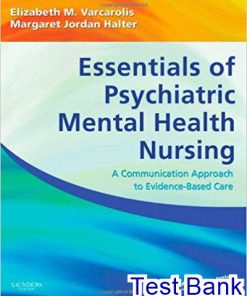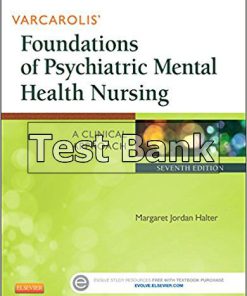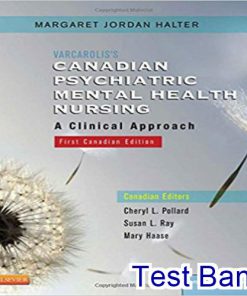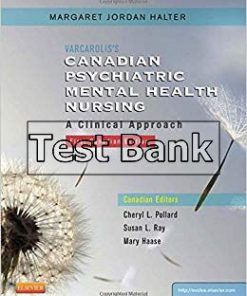Varcarolis Foundations of Psychiatric Mental Health Nursing A Clinical Approach 8th Edition Halter Test Bank
$50.00 Original price was: $50.00.$26.50Current price is: $26.50.
Varcarolis Foundations of Psychiatric Mental Health Nursing A Clinical Approach 8th Edition Halter Test Bank.
This is completed downloadable of Varcarolis Foundations of Psychiatric Mental Health Nursing A Clinical Approach 8th Edition Halter Test Bank

Product Details:
- ISBN-10 : 0323389678
- ISBN-13 : 978-0323389679
- Author: Margaret Jordan Halter
Varcarolis’ Foundations of Psychiatric Mental Health Nursing, 8th Edition is the most comprehensive RN psychiatric nursing text on the market! User-friendly by design, it simplifies the often-intimidating subject of psychiatric mental health nursing with a practical, clinical perspective. Revised with the help of a readability expert, chapters follow the nursing process framework and progress from theory to application, preparing you for practice with real-world examples. New to this edition is coverage of neurobiology of the brain throughout the Major Disorders chapters, the latest DSM-5 guidelines, and coverage of trauma, pediatric mental health, major disorders, QSEN competencies, and more!
Table of Content:
- Unit I. Foundations in Theory
- 1. Mental Health and Mental Illness
- Mental Health and Mental Illness
- Mental Health Continuum
- Risk and Protective Factors
- Legislation and Mental Health Funding
- Epidemiology of Mental Disorders
- Psychiatric-Mental Health Nursing
- Future Issues for Psychiatric-Mental Health Nurses
- Advocacy and Legislative Involvement
- Key Points to Remember
- Critical Thinking
- 2. Theories and Therapies
- Psychoanalytic Theories and Therapies
- Interpersonal Theories and Therapies
- Behavioral Theories and Therapies
- Cognitive Theories and Therapies
- Humanistic Theories
- Biological Theories and Therapies
- Developmental Theories
- Conclusion
- Key Points to Remember
- Critical Thinking
- 3. Psychobiology and Psychopharmacology
- Structure and Function of the Brain
- Action of Psychotropic Drugs
- Key Points to Remember
- Critical Thinking
- Unit II. Foundations for Practice
- 4. Treatment Settings
- Background
- Continuum of Care
- Outpatient Care Settings
- Prevention in Outpatient Care
- Outpatient Psychiatric Nursing Care
- Inpatient Care Settings
- Considerations for Inpatient Care
- Inpatient Psychiatric Nursing Care
- Specialty Treatment Settings
- Key Points to Remember
- Critical Thinking
- 5. Cultural Implications
- Minority Status, Race, Ethnicity, and Culture
- Demographic Shifts in the United States
- Basic Worldviews
- Impact of Culture
- Cultural Barriers to Mental Health Services
- Populations at Risk for Mental Illness and Inadequate Care
- Culturally Competent Care
- Key Points to Remember
- Critical Thinking
- 6. Legal and Ethical Considerations
- Ethical Concepts
- Mental Health Laws
- Admission and Discharge Procedures
- Patients’ Rights Under the Law
- Laws Relevant to Psychiatric Nursing
- Standards for Nursing Care
- Acting on Questionable Practice
- Documentation of Care
- Forensic Nursing
- Violence in the Psychiatric Setting
- Key Points to Remember
- Critical Thinking
- Unit III. Psychosocial Nursing Tools
- 7. The Nursing Process and Standards of Care
- Standards of Practice for Psychiatric-Mental Health Nursing: Standard 1: Assessment
- Standards of Practice for Psychiatric-Mental Health Nursing: Standard 2: Diagnosis
- Standards of Practice for Psychiatric-Mental Health Nursing: Standard 3: Outcomes Identification
- Standards of Practice for Psychiatric-Mental Health Nursing: Standard 4: Planning
- Standards of Practice for Psychiatric-Mental Health Nursing: Standard 5: Implementation
- Standards of Practice for Psychiatric-Mental Health Nursing: Standard 6: Evaluation
- Documentation
- Key Points To Remember
- Critical Thinking
- 8. Therapeutic Relationships
- Concepts of the Nurse-Patient Relationship
- A Focus on Self-Awareness
- Peplau’s Model of the Nurse-Patient Relationship
- Factors that Promote Patients’ Growth
- Key Points to Remember
- Critical Thinking
- 9. Therapeutic Communication
- Introduction
- The Communication Process
- Factors that Affect Communication
- Verbal and Nonverbal Communication
- Communication Skills for Nurses
- The Clinical Interview
- Key Points to Remember
- Critical Thinking
- 10. Stress Responses and Stress Management
- Responses to and Effects of Stress
- Mediators of the Stress Response
- Nursing Management of Stress Responses
- Other Ways to Relax
- Key Points to Remember
- Critical Thinking
- Unit IV. Psychobiological Disorders
- 11. Childhood and Neurodevelopmental Disorders
- Risk Factors
- Health Policy
- Child and Adolescent Psychiatric-Mental Health Nursing
- Application of the Nursing Process
- Neurodevelopmental Disorders: Clinical Picture
- Communication Disorders
- Motor Disorders
- TIC Disorders
- Specific Learning Disorder
- Intellectual Disability
- Application of the Nursing Process
- Diagnosis
- Outcomes Identification
- Implementation
- Evaluation
- Autism Spectrum Disorder
- Application of the Nursing Process
- Diagnosis
- Outcomes Identification
- Implementation
- Evaluation
- Attention-Deficit/Hyperactivity Disorder
- Application of the Nursing Process
- Diagnosis
- Outcomes Identification
- Implementation
- Evaluation
- Quality Improvement
- Key Points to Remember
- Critical Thinking
- 12. Schizophrenia Spectrum Disorders
- Delusional Disorder
- Brief Psychotic Disorder
- Schizophreniform Disorder
- Schizoaffective Disorder
- Substance Induced Psychotic Disorder and Psychotic Disorder Due to Another Medical Condition
- Schizophrenia
- Epidemiology
- Comorbidity
- Risk Factors
- Application of the Nursing Process
- Diagnosis
- Outcomes Identification
- Planning
- Implementation
- Evaluation
- Quality Improvement
- Key Points to Remember
- Critical Thinking
- 13. Bipolar and Related Disorders
- Clinical Picture
- Epidemiology
- Comorbidity
- Risk Factors
- Application of the Nursing Process
- Diagnosis
- Outcomes Identification
- Planning
- Implementation
- Psychopharmacological Interventions
- Evaluation
- Quality Improvement
- Key Points to Remember
- Critical Thinking
- 14. Depressive Disorders
- Major Depressive Disorder
- Epidemiology
- Comorbidity
- Risk Factors
- Application of the Nursing Process
- Diagnosis
- Outcomes Identification
- Planning
- Implementation
- Psychobiolocial Interventions
- Biological Interventions
- Evaluation
- Quality Improvement
- Key Points to Remember
- Critical Thinking
- 15. Anxiety and Obsessive-Compulsive Disorders
- Anxiety
- Levels of Anxiety
- Defenses Against Anxiety
- Anxiety Disorders
- Clinical Picture
- Obsessive-Compulsive Disorders
- Risk Factors
- Application of the Nursing Process
- Diagnosis
- Outcomes Identification
- Planning
- Implementation
- Evaluation
- Quality Improvement
- Key Points to Remember
- Critical Thinking
- 16. Trauma, Stressor-Related, and Dissociative Disorders
- Trauma-Related Disorders in Children
- Clinical Picture
- Epidemiology
- Comorbidity
- Risk Factors
- Application of the Nursing Process
- Diagnosis
- Outcomes Identification
- Implementation
- Evaluation
- Attachment Disorders
- Trauma-Related Disorders in Adults
- Epidemiology
- Comorbidity
- Risk Factors
- Application of the Nursing Process
- Diagnosis
- Outcomes Identification
- Implementation
- Evaluation
- Acute Stress Disorder
- Diagnosis
- Outcomes Identification
- Implementation
- Evaluation
- Adjustment Disorder
- Dissociative Disorders
- Depersonalization/Derealization Disorder
- Dissociative Amnesia
- Dissociative Identity Disorder
- Epidemiology
- Comorbidity
- Risk Factors
- Application of the Nursing Process
- Diagnosis
- Outcomes Identification
- Planning
- Implementation
- Evaluation
- Key Points to Remember
- Critical Thinking Exercises
- 17. Somatic Symptom Disorders
- Clinical Picture
- Epidemiology
- Risk Factors
- Application of the Nursing Process
- Nursing Diagnosis
- Outcomes Identification
- Implementation
- Evaluation
- Factitious Disorder
- Clinical Picture
- Epidemiology
- Comorbidity
- Risk Factors
- Application of the Nursing Process
- Planning and Implementation
- Evaluation
- Key Points to Remember
- Critical Thinking
- 18. Eating and Feeding Disorders
- Anorexia Nervosa
- Epidemiology
- Comorbidity
- Risk Factors
- Application of the Nursing Process
- Diagnosis
- Outcomes Identification
- Planning
- Implementation
- Evaluation
- Bulimia Nervosa
- Epidemiology
- Comorbidty
- Risk Factors
- Application of the Nursing Process
- Diagnosis
- Outcomes Identification
- Planning
- Implementation
- Evaluation
- Binge-Eating Disorder
- Epidemiology
- Comorbidity
- Application of the Nursing Process
- Diagnosis
- Outcomes Identification
- Planning
- Implementation
- Evaluation
- Feeding Disorders
- Key Points to Remember
- Critical Thinking
- 19. Sleep-Wake Disorders
- Sleep
- Sleep Disorders
- Clinical Picture
- Comorbidity
- Application of the Nursing Process
- Assessment
- Diagnosis
- Outcomes Identification
- Planning
- Implementation
- Evaluation
- Key Points to Remember
- Critical Thinking
- 20. Sexual Dysfunction, Gender Dysphoria, and Paraphilias
- Sexuality
- Sexual Dysfunction
- Clinical Picture
- Epidemiology
- Comorbidity
- Risk Factors
- Application of the Nursing Process
- Diagnosis
- Outcomes Identification
- Planning
- Implementation
- Evaluation
- Gender Dysphoria
- Epidemiology
- Comorbidity
- Risk Factors
- Nursing Care for Gender Dysphoria
- Paraphilic Disorders
- Exhibitionistic Disorder
- Fetishistic Disorder
- Frotteuristic Disorder
- Pedophilic Disorder
- Sexual Sadism Disorder and Sexual Masochism Disorder
- Transvestic Disorder
- Voyeuristic Disorder
- Paraphilic Disorder Not Otherwise Specified
- Epidemiology
- Comorbidity
- Risk Factors
- Application of the Nursing Process
- Diagnosis
- Outcomes Identification
- Planning
- Implementation
- Evaluation
- Key Points to Remember
- Critical Thinking
- 21. Impulse Control Disorders
- Oppositional Defiant Disorder
- Risk Factors
- Treatment Approaches
- Intermittent Explosive Disorder
- Risk Factors
- Treatment Approaches
- Conduct Disorder
- Risk Factors
- Treatment Approaches
- Application of the Nursing Process
- Diagnosis
- Outcomes Identification
- Implementation
- Evaluation
- Key Points to Remember
- Critical Thinking
- 22. Substance-Related and Addictive Disorders
- Substance Use Disorders
- Epidemiology
- Comorbidity
- Risk Factors
- Clinical Picture
- Alcohol Use Disorder
- Application of the Nursing Process
- Assessment
- Diagnosis
- Outcomes Identification
- Planning
- Implementation
- Evaluation
- Key Points to Remember
- Critical Thinking
- 23. Neurocognitive Disorders
- Delirium
- Risk Factors
- Clinical Picture
- Application of the Nursing Process
- Nursing Diagnosis
- Outcomes Criteria
- Planning
- Intervention
- Evaluation
- Mild and Major Neurocognitve Disorders
- Alzheimer’s Disease
- Risk Factors
- Clinical Picture
- Application of the Nursing Process
- Nursing Diagnosis
- Outcomes Criteria
- Planning
- Intervention
- Evaluation
- Key Points to Remember
- Critical Thinking
- 24. Personality Disorders
- Clinical Picture
- Epidemiology and Comorbidity
- Risk Factors
- Cluster A Personality Disorders
- Cluster B Personality Disorders
- Cluster C Personality Disorders
- Antisocial Personality Disorder
- Epidemiology
- Etiology
- Application of the Nursing Process
- Diagnosis
- Outcomes Identification
- Planning
- Implementation
- Evaluation
- Borderline Personality Disorder
- Epidemiology and Comorbidity
- Etiology
- Application of the Nursing Process
- Diagnosis
- Outcomes Identification
- Planning
- Implementation
- Evaluation
- Key Points to Remember
- Critical Thinking
- Unit V. Trauma Interventions
- 25. Suicide and Nonsuicidal Self-Injury
- Epidemiology
- Risk Factors
- Clinical Picture
- Application of the Nursing Process
- Assessment
- Diagnosis
- Outcomes Criteria
- Planning
- Intervention
- Psychosocial Interventions
- Psychobiological Interventions
- Evaluation
- Nonsuicidal Self-Injury
- Clinical Picture
- Application of the Nursing Process
- Assessment
- Diagnosis
- Outcomes Criteria
- Planning
- Interventions
- Evaluation
- Key Points to Remember
- Critical Thinking
- 26. Crisis and Disaster
- Crisis Characteristics
- Crisis Theory
- Types of Crisis
- Phases of Crisis
- Application of the Nursing Process
- Assessment
- Diagnosis
- Outcomes Identification
- Planning
- Implementation
- Evaluation
- Key Points to Remember
- Critical Thinking
- 27. Anger, Aggression, and Violence
- Clinical Picture
- Epidemiology
- Comorbidity
- Etiology
- Application of the Nursing Process
- Diagnosis
- Outcomes Identification
- Planning
- Implementation
- Evaluation
- Key Points to Remember
- Critical Thinking
- 28. Child, Older Adult, and Intimate Partner Violence
- Child Abuse
- Intimate Partner Violence
- Older Adult Abuse
- Application of the Nursing Process
- Diagnosis
- Outcomes Identification
- Planning
- Implementation
- Evaluation
- Key Points to Remember
- Critical Thinking
- 29. Sexual Assault
- Sexual Assault and Sexual Violence
- Epidemiology
- Clinical Picture
- Application of the Nursing Process
- Diagnosis
- Outcomes Identification
- Planning
- Implementation
- Evaluation
- Conclusion
- Key Points to Remember
- Critical Thinking
- Unit VI. Interventions for Special Populations
- 30. Dying, Death, and Grieving
- Death and Dying
- Facilitating Death
- Advance Care Planning
- Nursing Care at the End of Life
- The Dying Process
- Grieving
- Self-Care
- Key Points to Remember
- Critical Thinking
- 31. Older Adults
- Mental Health Issues Related to Aging
- Healthcare Concerns of Older Adults
- Healthcare Decision Making
- Nursing Care of Older Adults
- Key Points to Remember
- Critical Thinking
- 32. Serious Mental Illness
- Serious Mental Illness Across the Lifespan
- Development of Serious Mental Illness
- Rehabilitation Versus Recovery: Two Models of Care
- Issues Confronting Those with Serious Mental Illness
- Serious Mental Illness Resources
- Evidence-Based Treatment Approaches
- Other Treatment Approaches
- Nursing Care of Patients with Serious Mental Illness
- Current Issues Affecting Those with SMI
- Key Points to Remember
- Critical Thinking
- 33. Forensic Nursing
- Forensic Nursing
- Forensic Psychiatric Nursing
- Correctional Nursing
- Key Points to Remember
- Critical Thinking
- Unit VII. Other Intervention Modalities
- 34. Therapeutic Groups
- From Group to Therapeutic Group
- Concepts Common to All Groups
- Phases of Group Development
- Group Participant Roles
- Therapeutic Framework for Groups
- Nurse as a Group Leader
- Ethical Issues in Group Therapy
- Dealing with Challenging Member Behaviors
- Expected Outcomes
- Key Points to Remember
- Critical Thinking
- 35. Family Interventions
- Family Structure
- Family Functions
- Overview of Family Therapy
- Concepts Central to Family Therapy
- Application of the Nursing Process
- Assessment
- Nursing Diagnosis
- Outcomes Identification
- Planning
- Intervention
- Evaluation
- Key Points to Remember
- Critical Thinking
- 36. Integrative Care
- Integrative Care in the United States
- Classification of Integrative Care
- Key Points to Remember
- Critical Thinking
- Appendix. NANDA-Approved Nursing Diagnoses 2015–2017
- Index
People Also Search:
varcarolis foundations of psychiatric mental health nursing a clinical approach halter
varcarolis foundations of psychiatric mental health nursing a clinical approach 8th edition halter
varcarolis foundations of psychiatric mental health nursing a clinical approach
varcarolis foundations of psychiatric mental health nursing a clinical approach 8th edition
varcarolis foundations of psychiatric mental health nursing a clinical approach 8th edition testbank download pdf
varcarolis foundations of psychiatric mental health nursing a clinical approach 8th edition download scribd




